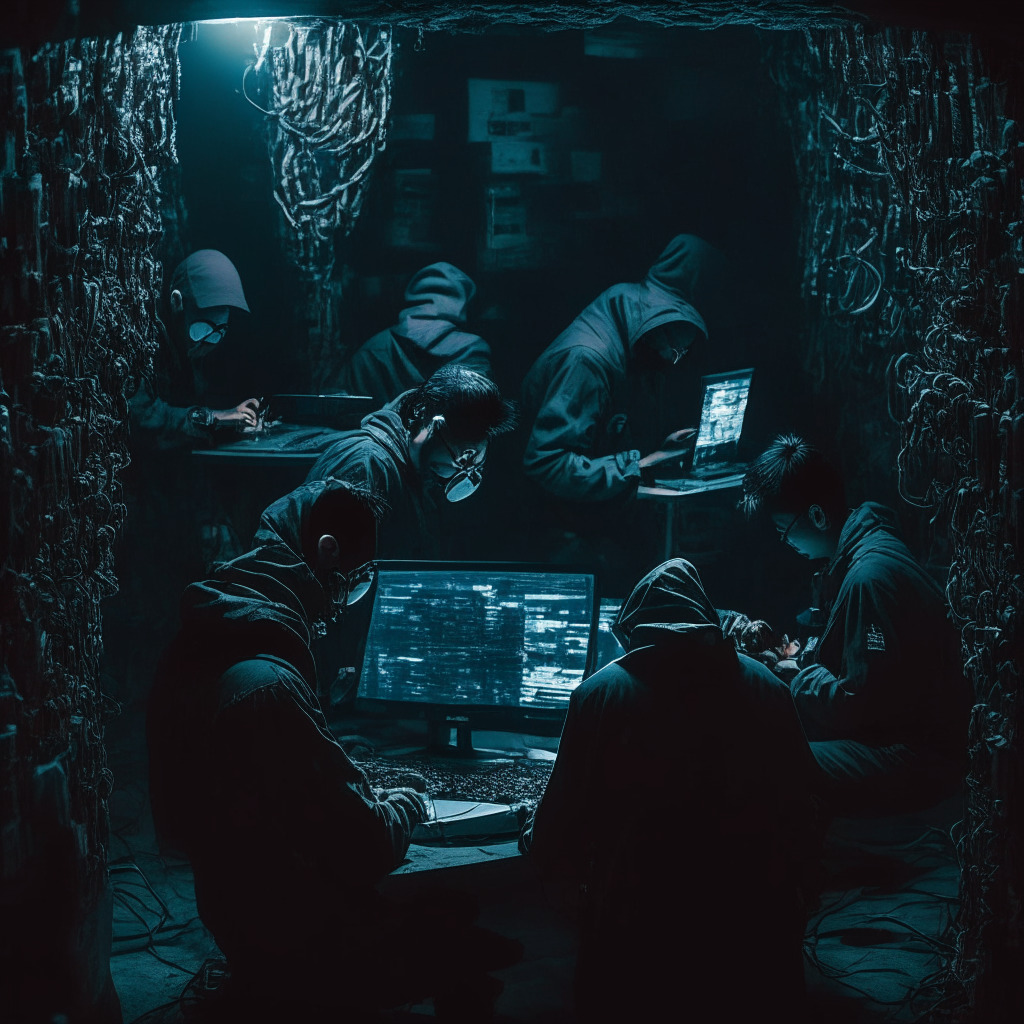Reports suggest that the notorious North Korean hacking group Lazarus Group has a cryptocurrency reserve worth over $47 million, mostly in Bitcoin, according to institutional crypto platform provider, 21.co. The hacker group’s stash was tracked to 295 wallets identified by the US Government.
Search Results for: North Korea
Lazarus Calling: North Korean Hackers Threaten Crypto Security Amidst $240 million Digital Heist
“Lazarus, a North Korean hacking group, has reportedly stolen $240 million worth of cryptocurrencies in the last 104 days. A rising number of breaches, particularly within the Ethereum network, demand strengthened security frameworks and proactive defense mechanisms to detect, prevent cyber attacks and safeguard digital assets.”
Unraveling The Fallacy of Declining Crypto Crimes: A Closer Look at North Korea’s Cyber Heists
“Despite an 80% fall in North Korean crypto heists, forensics firm Chainalysis warns against assuming an improved security landscape. Adaptive hacking techniques, including reliance on Russian-based exchanges for laundering stolen crypto, pose ongoing threats. This situation, potentially feeding North Korea’s missile program, invites international intervention and underscores the need for enhanced cryptocurrency security measures.”
Unmasking Lazarus: North Korea’s $55 Million Cryptocurrency Heist Reveals Growing Security Concerns
“CoinEx, a renowned crypto exchange, fell victim to a major security breach, allegedly by North Korean hackers, Lazarus Group, leading to an estimated loss of over $55 million. This instance amplifies the need for robust security measures and user caution to prevent similar future incidents.”
North Korean Cyber Attack on CoinEx: Unraveling the $54 Million Crypto Heist
North Korean cyber operatives are suspected for a recent $54 million security breach on CoinEx exchange involving multiple tokens. CoinEx assures users remaining assets are secured. This incident prompts crypto enthusiasts to re-evaluate security measures and trust in platforms, indirectly showcasing the resilience of blockchain technology.
North Korean Lazarus Group’s $41M Crypto Casino Heist: A Detailed Examination
The FBI has identified North Korean hacking group, the Lazarus Group, as responsible for the theft of $41 million from online crypto casino Stake. The large-scale cyber theft affected multiple blockchain networks including Ethereum, BNB Chain, Bitcoin, and Polygon.
State-Sponsored Crypto Heists: A Deep Dive into the Threat of North Korea’s Lazarus Group
“The North Korea-affiliated Lazarus Group has allegedly stolen $41 million in crypto from Stake.com, according to the FBI. Using a leaked private key to a hot wallet, the loot spread across Ethereum, BSC, Polygon, and Bitcoin networks. These hacking events highlight the crypto industry’s vulnerability and necessity for effective security measures.”
Dismantling North Korea’s Crypto Power: A Bold South Korean Stance Against Cybercrime
“South Korea has reportedly drafted a bill to neutralize North Korea’s crypto assets, aiming to cripple Pyongyang’s illicit weapons program. The bill proposes tracking and neutralizing stolen digital assets, offering potential benefits despite raising concerns about decentralization and anonymity in the cryptocurrency world.”
North Korean Hacks vs. Blockchain Transparency: The Duel That Shapes Crypto Security
The FBI has put six Bitcoin wallets, affiliated with North Korea’s Lazarus Group, on its radar, highlighting their potential possession of around $40 million. The Group’s success in crypto exploits is counterbalanced by blockchain’s public-ledger technology which makes laundering assets increasingly difficult due to traceable and freezeable transactions.
North Korean Hackers and Crypto Heists: A Landscape of Reward and Risk
“Cybercrime threatens the crypto industry, with North Korean hackers recently pilfering $40 million in bitcoin. As the crypto industry scales, it presents both substantial rewards and dangerous security risks, attracting criminals who cash out significant sums anonymously. Proactive security measures are critical to counter these challenges.”
Unmasking North Korea’s $2B Crypto Heist: Insights from TRM Labs and the Future of Blockchain Security
“TRM Labs reported that North Korean hackers have stolen over $2 billion in cryptocurrencies in the past five years. The criminals focused on the fast-growing DeFi sector, using techniques such as supply chain attacks, phishing, and infrastructure hacks. Interestingly, despite a broad decrease in crypto thefts in 2023, North Korea’s crypto crimes persisted.”
Securitize Takes Over Crypto Giant Onramp Amid Rising Threats from North Korean Hackers
Digital securities firm Securitize has acquired Onramp Invest, a cryptocurrency fund managing over $40 billion. This aims to simplify processes for investment advisors to access alternative assets. In light of rising cyber threats to the crypto industry, including a focus on decentralized finance (DeFi) ecosystems, vigilance becomes increasingly necessary.
North Korea’s Growing Crypto Heist: A $2 Billion Challenge to Blockchain Security
“North Korean cybercriminals have reportedly stolen an estimated $2 billion in cryptocurrency over the past five years, according to TRM Labs. Their targets increasingly include the decentralized finance (DeFi) ecosystem. The hackers use advanced attack methodologies and complex money laundering techniques, posing a significant threat to the crypto security landscape.”
North Korean Blockchain Heist: Unraveling the $37.3M CoinsPaid Cyber Breach
“Cryptocurrency platform CoinsPaid experienced a breach resulting in a $37.3 million loss, suspected to be orchestrated by state-backed Lazarus Group. Depicting the latent risks of crypto and systemic vulnerabilities, the incident emphasizes the necessity for robust security measures in the crypto-space.”
Atomic Wallet Breach: $100M Loss Linked to North Korea, Security Protocols under Scrutiny
Elliptic discovered that over $100 million was lost by Atomic Wallet users, with more than 5,500 wallets compromised. The Lazarus Group, allegedly linked to North Korea, is believed to be behind the breach. Dr. Sarah Brown emphasizes the need for advanced security protocols and user vigilance in the crypto market.
North Korea’s $3B Crypto Heist: Funding Missiles, Threatening Industry, and Exploiting DeFi Loopholes
North Korea’s cyber army has reportedly stolen $3 billion in cryptocurrencies over the past five years, with 50% of the funds allegedly used to fund the country’s ballistic missile program. The magnitude of these stolen funds poses a significant threat to the digital currency industry’s growth and security, highlighting the need for heightened cyber vigilance and collaboration between governments, cybersecurity experts, and crypto exchanges.
North Korean Crypto Hacks Target South Korea: Gaining Funds or Political Motives?
North Korean cybercriminals allegedly targeted South Korean ministers in a crypto hacking campaign, seizing a server with two cryptocurrency wallet addresses. Authorities continue to investigate if this is an attempt to steal funds or access valuable information, emphasizing the importance of robust security measures for users and institutions.
North Korean Hackers vs Atomic Wallet: $35M Stolen and Security Concerns Exposed
Atomic Wallet users might have fallen victim to Lazarus hacking group, losing around $35 million in cryptocurrencies. Elliptic identified connections between wallets from this hack and previous Lazarus hacks, as stolen crypto was funneled to the Sindbad.io mixer. The incident highlights the need for better security practices and scrutiny of wallet designs in the crypto ecosystem.
Crypto Tax Compliance Pressure and North Korea’s Alleged Laundering: A Troubling Connection
The crypto industry faces increasing pressure for tax compliance as US Congress members urge Treasury and IRS to implement regulations. Meanwhile, funds from the $35 million Atomic Wallet hack are traced to Sinbad.io, allegedly involved in laundering over $100 million in cryptoassets.
G7 Summit Sparks Crypto Regulation Debate amid North Korea Hacking Concerns
The G7 central bank governors and finance ministers’ summit has highlighted the urgent need for regulatory measures to prevent North Korea’s hacking activities involving cryptocurrencies. Japan calls for other nations to follow its lead in blocking North Korea’s raids, emphasizing the importance of a robust regulatory framework to address growing concerns surrounding crypto theft and misuse as global crypto adoption increases.
Japan’s $721M Crypto Hacks: North Korea’s Theft Strategy & Global Security Lessons
Japan has suffered $721 million in cryptocurrency theft by North Korean hackers, accounting for 30% of the global total, according to a study by Elliptic. Lax security systems in Japan and Vietnam are said to be the primary reasons for their vulnerability. The findings emphasize the importance of implementing robust security measures and increasing international cooperation against such threats.
North Korean Crypto Heists: Protecting Japan’s Booming Blockchain Economy
North Korean hackers have allegedly stolen $721 million in cryptocurrency from Japan since 2017, contributing to 30% of global crypto thefts. Japan’s favorable regulatory environment and increased cryptocurrency adoption create an attractive target, requiring a balance between innovation and stringent security measures to protect investors.
South Korea’s Crypto Investigation: Uncovering Politicians’ Digital Asset Secrets
South Korea’s Prosecutor-General, Lee Won-seok, commits to a “thorough review” of the cryptocurrency sector amidst growing public suspicion of politicians’ digital asset holdings and the recent Coin Gate scandal involving insider trading allegations. The investigation will focus on areas such as token listings on exchanges, investment problems, speculation issues, and crypto-powered illicit activities.
Defying Sanctions: Ethereum’s Tornado Cash & The Power of Crypto Resilience Amid Controversy
Despite facing US Treasury Department sanctions in August 2022, Tornado Cash has reportedly circulated $77.35 million worth of assets on Ethereum mainnet over the last month, according to blockchain intelligence firm, Arkham. The US allegations pertain to the platform’s use by North Korean hacker group, Lazarus Group, for money laundering. After an initial slump, Tornado Cash’s current total volume locked stands at $187.9 million.
Unraveling the Lazarus Group: A Deep Dive into their $47m Cryptocurrency Loot
“The North Korean Lazarus Group, a notorious hacking collective, reportedly has $47 million in cryptocurrencies, the majority in Bitcoin. Despite a surprising lack of privacy coins, their wallets are active, suggesting underreported holdings. Previously implicated in major crypto hacks, their activities question security in blockchain.”
Lazarus Group’s Crypto Heists: A Rising Challenge for Blockchain Security Measures
The recent $41 million Stake crypto platform hack attributed to North Korea’s Lazarus Group has added to growing cyber crime concerns in the crypto world. With a total of $200 million in stolen crypto funds recorded this year, heightened cybersecurity measures are now essential, yet challenging due to the decentralized nature of cryptocurrencies.
Storm Brewing: Tornado Cash and the Controversy of Blockchain Legality
Co-founder of Ethereum-based “crypto mixer” Tornado Cash, Roman Storm faces severe charges including money laundering and sanctions violations. The charges are closely tied to Tornado Cash’s operations and the allegedly connected North Korean hacker group, Lazarus Group – further leading to international sanction violations complications.
Crossing Borders: Crypto Regulation Varies from U.S Celebrities to Chinese Property Laws
“Cryptocurrency regulation is emerging as an international focal point, highlighting distinct differences between jurisdictions. While China’s court recognizes crypto as property, South Korea targets North Korean digital assets. Meanwhile, the London Stock Exchange and OKX embark on blockchain ventures, and MoonPay adapts to UK regulations.”
Tornado Cash Indictments: Defining Moment for Crypto or Straightforward Crime?
The Tornado Cash indictments have raised concerns about the regulation of decentralized trading platforms. The co-founders are accused of enabling North Korea to launder crypto. However, these allegations point to monitoring fraudulent activities, not suppressing the industry. The focus is more on developer actions than setting a precedent for the entire cryptocurrency industry.
Cryptocurrency Coders in Legal Crosshairs: Who is Accountable for Blockchain Misuse?
“Roman Storm and Roman Semenov, coders of the Tornado Cash protocol, face U.S. legal proceedings, accused of aiding North Korea’s Lazarus Group with money laundering. This indictment raises questions on developer accountability, regulation standards, and the balance between potential national security risks and the right to financial independence and privacy in blockchain technology.”
Unmasking the Hermit Kingdom’s Crypto Heists: Blockchain Security vs Cyber Criminals
“The digital fortress of cryptocurrencies faces a possible breach by notorious North Korean hacker groups, Lazarus and APT38, suspected of planning to liquidate over $40 million in stolen BTC. North Korea’s increased cyber involvement, amassing $2 billion in crypto loot over five years, raises concerns about the security of the cryptocurrency framework and necessitates vigilance from crypto firms and individual investors.”
Tornado Cash Founders Charged: A Blow for Privacy or Triumph for Law Enforcement?
“Roman Storm and Roman Semenov, key figures of Tornado Cash, are facing charges for helping North Korea’s Lazarus Group launder over $1 billion via a privacy mixer. This incident sparks debate on blockchain privacy protections being exploited by criminals versus the potential shortfalls of legal jurisdiction in regulating such abuses.”































